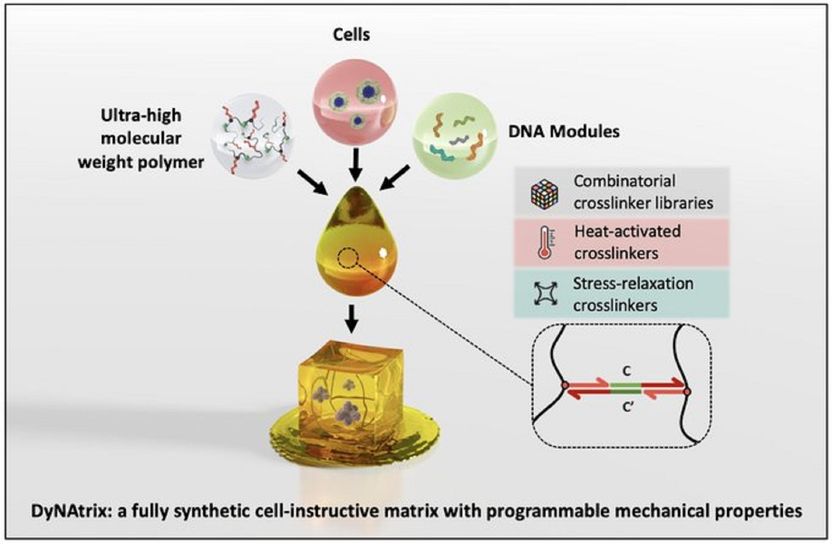Programmable DNA hydrogels for advanced cell culture and personalized medicine
The team of Dr. Elisha Krieg at the Leibniz Institute of Polymer Research Dresden has developed a dynamic DNA-crosslinked matrix (DyNAtrix) by combining classical synthetic polymers with programmable DNA crosslinkers. DNA’s highly specific and predictable binding gives researchers unparalleled control over key mechanical properties of the material. The findings published in Nature Nanotechnology, are highly relevant to in vitro cell culture materials for biological research.

DyNAtrix: a fully synthetic cell-instructive matrix with programmable mechanical properties
IPF: Elisha Krieg und Yu-Hsuan Peng
In-vitro culture of biological cells plays an important role in advancing biological research. However, currently available cell culture materials have significant drawbacks. Many of them are derived from animal sources, leading to poor reproducibility, and making it difficult to fine-tune their mechanical properties. Therefore, there is an urgent need for new approaches to create soft and biocompatible materials with predictable properties.
The team of Dr. Elisha Krieg at the Leibniz Institute of Polymer Research Dresden has developed a dynamic DNA-crosslinked matrix (DyNAtrix) by combining classical synthetic polymers with programmable DNA crosslinkers. DNA’s highly specific and predictable binding gives researchers unparalleled control over key mechanical properties of the material. Their research shows how DyNAtrix enables systematic control over its viscoelastic, thermodynamic, and kinetic characteristics by simply changing the DNA sequence information. The predictable stability of DNA crosslinks allows the stress-relaxation properties to be rationally tuned, mimicking the characteristics of living tissues. DyNAtrix is self-healing, printable, and exhibits high stability and controllable degradation. Cell culture with human mesenchymal stromal cells, pluripotent stem cells, canine kidney cysts, and human trophoblast organoids demonstrate the high biocompatibility of the materials.
The programmable properties of the material point to promising potential for new applications in tissue culture. The ongoing studies focus on the effect of viscoelastic properties on cell and organoid development. In the future, DyNAtrix can be used in basic research and personalized medicine, for example, to reproduce and investigate patient-derived tissue models in the laboratory.
Original publication
Other news from the department science

Get the analytics and lab tech industry in your inbox
By submitting this form you agree that LUMITOS AG will send you the newsletter(s) selected above by email. Your data will not be passed on to third parties. Your data will be stored and processed in accordance with our data protection regulations. LUMITOS may contact you by email for the purpose of advertising or market and opinion surveys. You can revoke your consent at any time without giving reasons to LUMITOS AG, Ernst-Augustin-Str. 2, 12489 Berlin, Germany or by e-mail at revoke@lumitos.com with effect for the future. In addition, each email contains a link to unsubscribe from the corresponding newsletter.
























































